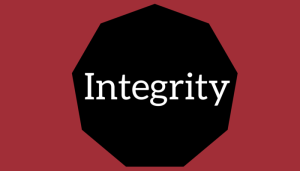 One of the value words that shows up with almost every organization I work with is “integrity” or “honesty.” The difficulty with these words, or values, is that if you don’t declare it, does it mean that your organization doesn’t have honesty or integrity? Of course, we all want to think that we do, or that it’s a given, however, it’s important to define what we mean by the word integrity and be explicit about it if we intend for it to be an organizational value.
One of the value words that shows up with almost every organization I work with is “integrity” or “honesty.” The difficulty with these words, or values, is that if you don’t declare it, does it mean that your organization doesn’t have honesty or integrity? Of course, we all want to think that we do, or that it’s a given, however, it’s important to define what we mean by the word integrity and be explicit about it if we intend for it to be an organizational value.
If we look at the dictionary definition of the word “integrity” it is “1. The quality or state of being complete; unbroken condition; wholeness; entirety; 2. The quality or state of being unimpaired; perfect condition; soundness and 3. The quality or state of being of sound moral principle; uprightness, honesty, and sincerity.” Any of these definitions can work for organizations, but all three aspects actually need to be there to have a full or complete definition of integrity. So how do we translate this into something that is easy to remember and more importantly alive in the organization?
I came across an article with definitions, or ways of being, that I think best describe what I’m talking about. It is an interview of Michael Jensen called, “Integrity” in Rotman Magazine. In it, the definition of integrity is simplified and described as “honoring one’s word.”
What this means is that integrity comes down to keeping your word as follows:
- What I said I would do or not do
- What I know to do, or not do
- What is expected of me by others (even if they haven’t said so)
- What I say is so (assert)
- What I stand for
- Moral, ethical and legal standards of the societies, groups and governmental entities in which I enjoy membership
So if honoring your word means adhering to the above, you will always be in integrity and it becomes a way of being, rather than a value. It simply is.
Let’s start with the first one. It’s pretty straight forward. Do what you say you’re going to do or not do. This means to follow through.
The second one is a little more difficult. It’s what you know to do or not do. The common objection to this one is “what if I don’t know?” which is actually easily handled. You didn’t know so you’re not out of integrity with your word.
Number 3, “What is expected of you, even if not explicitly stated,” is where some people get into trouble. “Well, if they didn’t say, I don’t have to do it.” When I hear this response from employees, I’m not sympathetic. When you know what’s expected of you, you need to do it. If you don’t know, you should ask.
Number 4, “what you say is so,” simply means honoring what you said and what you stand for is the actions that result from your word or beliefs.
The last one, “moral, ethical and legal standards,” is pretty straightforward too.
Lastly, what happens when you do or say something against one of these six aspects of honoring your word? Easy! You clean it up. You own it, and you make it right. If you stand for something and then do not do it, you are first, out of integrity with yourself and likely with another so make it right. That’s honoring your word.
Can you imagine if these six aspects of honoring ones’ word were posted on every company and actually adhered to on a regular basis? Would anyone have to question whether Integrity was a value? Not likely as you would be living as part of your daily, intentional culture. Regardless if these are your definitions for Integrity or Honesty, make sure you actually have a definition that is easy to learn, easy to live, and makes being in integrity easy to do
